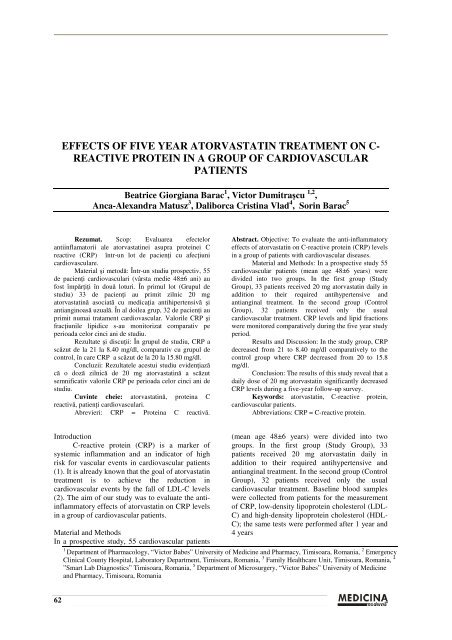Sumar Sponsorii manifestării - Medicina Modernă
Sumar Sponsorii manifestării - Medicina Modernă
Sumar Sponsorii manifestării - Medicina Modernă
Create successful ePaper yourself
Turn your PDF publications into a flip-book with our unique Google optimized e-Paper software.
62<br />
EFFECTS OF FIVE YEAR ATORVASTATIN TREATMENT ON C-<br />
REACTIVE PROTEIN IN A GROUP OF CARDIOVASCULAR<br />
PATIENTS<br />
Beatrice Giorgiana Barac 1 , Victor Dumitraşcu 1,2 ,<br />
Anca-Alexandra Matusz 3 , Daliborca Cristina Vlad 4 , Sorin Barac 5<br />
Rezumat. Scop: Evaluarea efectelor<br />
antiinflamatorii ale atorvastatinei asupra proteinei C<br />
reactive (CRP) într-un lot de pacienţi cu afecţiuni<br />
cardiovasculare.<br />
Material şi metodă: Într-un studiu prospectiv, 55<br />
de pacienţi cardiovasculari (vârsta medie 48±6 ani) au<br />
fost împărţiţi în două loturi. În primul lot (Grupul de<br />
studiu) 33 de pacienţi au primit zilnic 20 mg<br />
atorvastatină asociată cu medicaţia antihipertensivă şi<br />
antianginoasă uzuală. În al doilea grup, 32 de pacienţi au<br />
primit numai tratament cardiovascular. Valorile CRP şi<br />
fracţiunile lipidice s-au monitorizat comparativ pe<br />
perioada celor cinci ani de studiu.<br />
Rezultate şi discuţii: În grupul de studiu, CRP a<br />
scăzut de la 21 la 8.40 mg/dl, comparativ cu grupul de<br />
control, în care CRP a scăzut de la 20 la 15.80 mg/dl.<br />
Concluzii: Rezultatele acestui studiu evidenţiază<br />
că o doză zilnică de 20 mg atorvastatină a scăzut<br />
semnificativ valorile CRP pe perioada celor cinci ani de<br />
studiu.<br />
Cuvinte cheie: atorvastatină, proteina C<br />
reactivă, patienţi cardiovasculari.<br />
Abrevieri: CRP = Proteina C reactivă.<br />
Introduction<br />
C-reactive protein (CRP) is a marker of<br />
systemic inflammation and an indicator of high<br />
risk for vascular events in cardiovascular patients<br />
(1). It is already known that the goal of atorvastatin<br />
treatment is to achieve the reduction in<br />
cardiovascular events by the fall of LDL-C levels<br />
(2). The aim of our study was to evaluate the antiinflammatory<br />
effects of atorvastatin on CRP levels<br />
in a group of cardiovascular patients.<br />
Material and Methods<br />
In a prospective study, 55 cardiovascular patients<br />
Abstract. Objective: To evaluate the anti-inflammatory<br />
effects of atorvastatin on C-reactive protein (CRP) levels<br />
in a group of patients with cardiovascular diseases.<br />
Material and Methods: In a prospective study 55<br />
cardiovascular patients (mean age 48±6 years) were<br />
divided into two groups. In the first group (Study<br />
Group), 33 patients received 20 mg atorvastatin daily in<br />
addition to their required antihypertensive and<br />
antianginal treatment. In the second group (Control<br />
Group), 32 patients received only the usual<br />
cardiovascular treatment. CRP levels and lipid fractions<br />
were monitored comparatively during the five year study<br />
period.<br />
Results and Discussion: In the study group, CRP<br />
decreased from 21 to 8.40 mg/dl comparatively to the<br />
control group where CRP decreased from 20 to 15.8<br />
mg/dl.<br />
Conclusion: The results of this study reveal that a<br />
daily dose of 20 mg atorvastatin significantly decreased<br />
CRP levels during a five-year follow-up survey.<br />
Keywords: atorvastatin, C-reactive protein,<br />
cardiovascular patients.<br />
Abbreviations: CRP = C-reactive protein.<br />
(mean age 48±6 years) were divided into two<br />
groups. In the first group (Study Group), 33<br />
patients received 20 mg atorvastatin daily in<br />
addition to their required antihypertensive and<br />
antianginal treatment. In the second group (Control<br />
Group), 32 patients received only the usual<br />
cardiovascular treatment. Baseline blood samples<br />
were collected from patients for the measurement<br />
of CRP, low-density lipoprotein cholesterol (LDL-<br />
C) and high-density lipoprotein cholesterol (HDL-<br />
C); the same tests were performed after 1 year and<br />
4 years<br />
1 Department of Pharmacology, “Victor Babes” University of Medicine and Pharmacy, Timisoara, Romania, 2 Emergency<br />
Clinical County Hospital, Laboratory Department, Timisoara, Romania, 3 Family Healthcare Unit, Timisoara, Romania, 4<br />
”Smart Lab Diagnostics” Timisoara, Romania, 5 Department of Microsurgery, “Victor Babes” University of Medicine<br />
and Pharmacy, Timisoara, Romania


